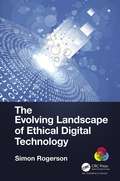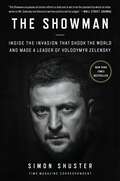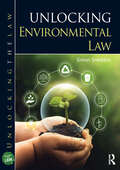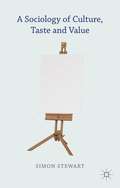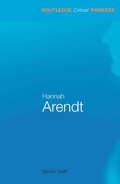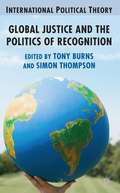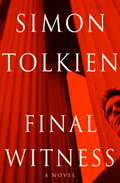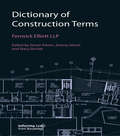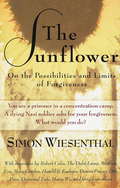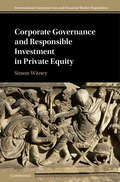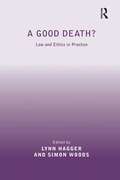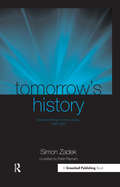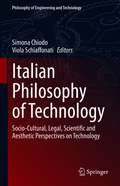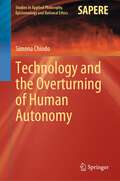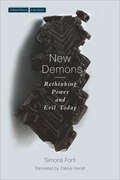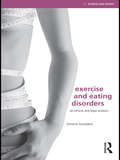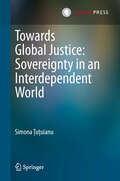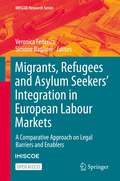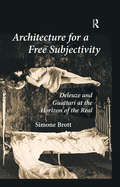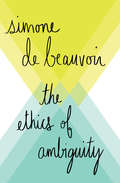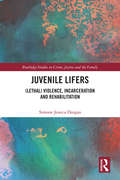- Table View
- List View
The Evolving Landscape of Ethical Digital Technology
by Simon RogersonIn a world that is awash in ubiquitous technology, even the least tech-savvy know that we must take care how that technology affects individuals and society. That governments and organizations around the world now focus on these issues, that universities and research institutes in many different languages dedicate significant resources to study the issues, and that international professional organizations have adopted standards and directed resources toward ethical issues in technology is in no small part the result of the work of Simon Rogerson. – Chuck Huff, Professor of Social Psychology at Saint Olaf College, Northfield, Minnesota In 1995, Apple launched its first WWW server, Quick Time On-line. It was the year Microsoft released Internet Explorer and sold 7 million copies of Windows 95 in just 2 months. In March 1995, the author Simon Rogerson opened the first ETHICOMP conference with these words: We live in a turbulent society where there is social, political, economic and technological turbulence … it is causing a vast amount of restructuring within all these organisations which impacts on individuals, which impacts on the way departments are set up, organisational hierarchies, job content, span of control, social interaction and so on and so forth. … Information is very much the fuel of modern technological change. Almost anything now can be represented by the technology and transported to somewhere else. It's a situation where the more information a computer can process, the more of the world it can actually turn into information. That may well be very exciting, but it is also very concerning. That could be describing today. More than 25 years later, these issues are still at the forefront of how ethical digital technology can be developed and utilised. This book is an anthology of the author’s work over the past of 25 years of pioneering research in digital ethics. It is structured into five themes: Journey, Process, Product, Future and Education. Each theme commences with an introductory explanation of the papers, their relevance and their interrelationship. The anthology finishes with a concluding chapter which summarises the key messages and suggests what might happen in the future. Included in this chapter are insights from some younger leading academics who are part of the community charged with ensuring that ethical digital technology is realised.
Das Recht der erneuerbaren Energien zur Wärmeversorgung des Gebäudesektors: Rechtliche Prüfung der Rahmenbedingungen des Einsatzes von Wärme aus erneuerbaren Energien in Gebäuden sowie der Weiterentwicklungsmöglichkeiten zur Erfüllung der Klimaschutzziele Deutschlands (Schriftenreihe des Instituts für Klimaschutz, Energie und Mobilität)
by Simon Schäfer-StradowskyDer Doktorarbeit liegt die Arbeitshypothese zugrunde, dass es für das Erreichen der Klimaschutzziele Deutschlands im Gebäudesektor der erfolgreichen Integration erneuerbarer Energien in die Wärmeversorgung von Gebäuden bedarf und hierfür die EE-Wärme-Quote als eines der wesentlichen rechtlichen Instrumente weiterentwickelt werden muss. Der Fokus der vorliegenden rechtlichen Betrachtung liegt dabei auf den Regelungen im GEG zum Einsatz von erneuerbaren Energien in Gebäuden.
The Showman: Inside the Invasion That Shook the World and Made a Leader of Volodymyr Zelensky
by Simon ShusterINSTANT NEW YORK TIMES BESTSELLER!"Shuster crafts an intimate account of the Russian invasion, which vividly captures Zelensky’s transformation from a clean-cut funnyman into a war hero out of central casting." --New York Times Book Review; Editors' Choice Selection“The Showman surpasses all similar efforts to date and is set to be the standard by which all other works on Mr. Zelensky and Ukraine’s wartime politics will be judged." —Wall Street JournalA monumental account of Russia’s invasion of Ukraine and the forging of a leader, The Showman provides an insider’s perspective on the war reshaping our world, based on unprecedented access to Volodymyr Zelensky and the high command in Kyiv.Time correspondent Simon Shuster chronicles the life and leadership of Volodymyr Zelensky from the dressing rooms of his variety shows to the muddy trenches of Ukraine’s war with Russia. Based on four years of reporting; extensive travels with President Zelensky to the front; and dozens of interviews with him, his wife, his friends and enemies, his advisers, ministers and military commanders, Shuster tells the intimate and revealing story of the president’s evolution from a slapstick actor to a symbol of resilience.In their most candid accounts of the war so far, members of Zelensky’s inner circle show how the president’s character changed under the strains of leadership and the horrors he witnessed each day. His wife, First Lady Olena Zelenska, describes her escape from Kyiv with their children, her life on the run, and the tensions that emerged in her marriage as she struggled to return to a meaningful role in the administration. Ukraine’s top military commander, General Valery Zaluzhny, shares the untold story of his fraught relationship with the president and the subsequent consequences.Reflecting on their own regrets and critical decisions, Zelensky and his senior aides open up about the causes of the Russian invasion and how it may have been avoided. They describe with astonishing frankness how their peace talks with Vladimir Putin fell apart and how their faith in the U.S. faltered, both under Donald Trump and Joe Biden.The Showman provides the first inside account of Zelensky’s life amid the invasion, offering a clear-eyed view of his failures to prepare for it and his willingness to silence dissent under martial law. What emerges is a complex picture of a man struggling to break what he sees as a historical cycle of oppression that began generations before he was born. Even as the war drags on, Zelensky lays out his vision for its future course and, through his actions, demonstrates his strategy for countering the Russians and keeping the West on his side.The Showman, as a work of eyewitness journalism, provides an essential perspective on the war defining our age, resulting in a riveting, vivid portrait of the invasion as experienced by its number one target and improbable hero.
Unlocking Environmental Law (Unlocking the Law)
by Simon SneddonUnlocking Environmental Law is the essential introduction to this fascinating, controversial, and fast-moving area of contemporary law, ensuring that you grasp the main concepts with ease. Containing accessible explanations in clear and precise terms that are easy to understand, it provides an excellent foundation for learning and revising Environmental Law. Split into three parts, the book outlines the philosophical foundations of environmental law, and how these have influenced political decision-making. The information is clearly presented in a logical structure and the following features support learning, helping you to advance with confidence: • clear learning outcomes at the beginning of each chapter set out the skills and knowledge you will need to get to grips with the subject; • key facts boxes throughout each chapter allow you to progressively build and consolidate your understanding; • end-of-chapter summaries provide a useful check-list for each topic; •cases and judgments are highlighted to help you find them and add them to your notes quickly; • frequent activities and self-test questions and sample essay questions are included so you can put your knowledge into practice; • a brand new ‘critiquing the law’ feature is designed to foster essential critical thinking skills. Charting the development of regulations, examining emerging and future trends for environmental law, and looking at specific areas of law, including air pollution, climate change, laws around water, and the regulation of social and private space, this concise, accessible text is ideal for anyone new to environmental law.
A Sociology of Culture, Taste and Value
by Simon StewartThis book explores sociological debates in relation to culture, taste and value. It argues that sociology can contribute to debates about aesthetic value and to an understanding of how people evaluate.
Hannah Arendt (Routledge Critical Thinkers)
by Simon SwiftHannah Arendt's work offers a powerful critical engagement with the cultural and philosophical crises of mid-twentieth-century Europe. Her idea of the banality of evil, made famous after her report on the trial of the Nazi war criminal, Adolf Eichmann, remains controversial to this day. In the face of 9/11 and the 'war on terror', Arendt's work on the politics of freedom and the rights of man in a democratic state are especially relevant. Her impassioned plea for the creation of a public sphere through free, critical thinking and dialogue provides a significant resource for contemporary thought. Covering her key ideas from The Origins of Totalitarianism and The Human Condition as well as some of her less well-known texts, and focussing in detail on Arendt's idea of storytelling, this guide brings Arendt's work into the twenty-first century while helping students to understand its urgent relevance for the contemporary world.
Medical Accident Liability and Redress in English and French Law
by Simon TaylorIn 2002 France introduced an out-of-court settlement scheme for medical accidents. The scheme guarantees compensation for the victims of the most serious medical accidents irrespective of fault and operates in parallel with existing liability rules. In this book Simon Taylor compares English and French law on medical accident liability and redress and considers what lessons the French model can provide for potential reform in England and elsewhere. Taylor emphasizes the effect of the English and French rules on access to compensation and on the cost of liability and examines the problems that have been posed by the introduction of an administrative redress scheme in France. This book looks at the potential consequences of English and French rules for the doctor-patient relationship and for patient safety, and considers the role that national legal traditions and cultures of civil liability in England and France play in shaping national law in this area.
Global Justice and the Politics of Recognition
by Simon Thompson Tony BurnsTwo issues have been central within political philosophy in the last decade or so. The first is the debate over 'the politics of distribution versus the politics of recognition, ' which is usually associated with the work of Axel Honneth and Nancy Fraser. The second is discussion of the phenomenon known as globalization, focusing on the notions of cosmopolitanism and global justice. This book explores the relationship between these two issues. It considers not only the global dimension of the politics of recognition, but also how recognition theory can provide new insights into our understanding of problems of global justice, especially those of a non-distributive nature. A number of the contributors consider the relevance of Hegel's theory of recognition for our understanding of these issues.
Final Witness: A Novel
by Simon TolkienThe grandson of J.R.R. Tolkien makes a thrilling debut as a novelist in this suspenseful courtroom drama that will have you guessing to the very end.“Don’t let the author’s last name confuse you, for there are no Hobbits in this debut novel by the grandson of J.R.R. Tolkien, only a wonderful story of family, relationships, and suspense. . . . Part English cozy, part family saga, part courtroom drama, this genre-bending work of fiction is touching and enchanting.” —Booklist (starred review)“The book is fast-paced and crisply plotted, with Tolkien elegantly piecing together the different perspectives and introducing unexpected twists.” —Publishers Weekly“Tolkien’s skill as a storyteller is worthy of notice in this taut, well-paced legal thriller. The excellent courtroom drama and well-drawn, believable characters make this a good choice. . . . With an easily recognizable surname, a formidable Oxford education, and a successful career as a London barrister, the grandson of the author of The Lord of the Rings is bound to create a stir with this debut novel.” —Library JournalOne summer night, two men break into an isolated manor house and kill Lady Anne Robinson. Her son, Thomas, convinces the police that his father’s beautiful personal assistant sent the killers, but Thomas is known for his overactive imagination, and he has reasons to lie.Thomas’s father, Sir Peter Robinson, the British minister of defense, refuses to believe his son. Instead, he marries his assistant, Greta Grahame, and will be giving evidence for the defense at her trial. He will be the final witness.Author Simon Tolkien successfully combines legal suspense and psychological tension in this sharply etched portrait of four people whose lives are changed by a murder. Alternating between the trial in London’s Central Criminal Court and private moments among the characters, Tolkien expertly describes the art of the trial, the clash between Britain’s social classes, and, most notably, the complexity of family relations.Who is telling the truth—the new wife or the bereaved son? What will Sir Peter tell the court? With tantalizing ambiguity, Tolkien keeps readers guessing about the true motivations of these characters until the final witness.
Dictionary of Construction Terms
by Simon TolsonThe Dictionary of Construction Terms offers clear and concise explanations of the most commonly encountered legal and technical terms, phrases and abbreviations used throughout the construction industry. It will save valuable time when searching for an authoritative explanation of a frequently used term and will become a practical reference for construction lawyers, practitioners and students, as well as those in related industries including planning, property and insurance. Why you should buy this book: There is no other all-inclusive collection of legal and technical terms available at present Convenient source of information for lawyers, practitioners and students Includes a list of common technical acronyms (ie. DPC, DPM, FFL) Lists acronyms of common institutions such as the ICE, JCT and ACE Examples of definitions: Modular construction A modern construction method whereby the building is constructed using prefabricated or pre-assembled building sections or modules. The three-dimensional building sections are typically fabricated and assembled in an enclosed factory environment and then delivered to site, ready for installation. Modular construction is aimed at minimising construction time by standardising design components, providing consistent quality and allowing site preparation and building activities to commence concurrently with the construction of the factory-made modules. Snagging The process of formally inspecting the construction works to identify any incomplete works or defects in completed works. A snagging list (or ‘punch list’) is a schedule of defects resulting from this inspection. These items typically need to be rectified prior to the issuing of a completion certificate or handing-over of the works although in some cases a completion certificate will be issued with a snagging list attached.
The Sunflower: On the Possibilities and Limits of Forgiveness
by Simon WiesenthalWhile imprisoned in a Nazi concentration camp, Simon Wiesenthal was taken one day from his work detail to the bedside of a dying member of the SS. Haunted by the crimes in which he had participated, the soldier wanted to confess to--and obtain absolution from--a Jew. Faced with the choice between compassion and justice, silence and truth, Wiesenthal said nothing. But even years after the way had ended, he wondered: Had he done the right thing? What would you have done in his place?In this important book, fifty-three distinguished men and women respond to Wiesenthal's questions. They are theologians, political leaders, writers, jurists, psychiatrists, human rights activists, Holocaust survivors, and victims of attempted genocides in Bosnia, Cambodia, China and Tibet. Their responses, as varied as their experiences of the world, remind us that Wiesenthal's questions are not limited to events of the past. Often surprising and always thought provoking, The Sunflower will challenge you to define your beliefs about justice, compassion, and human responsibility.From the Trade Paperback edition.
Corporate Governance and Responsible Investment in Private Equity (International Corporate Law and Financial Market Regulation)
by Simon WitneyPrivate equity-backed companies are ubiquitous and economically significant. Consequently, the corporate governance of these companies matters to all of us, and – not surprisingly – is coming under increasing scrutiny. Simon Witney, a practicing private equity lawyer, positions private equity portfolio companies within existing academic theory and examines the laws that apply to them in the UK. He analyses the actual governance frameworks that are put in place and identifies problems created by the legal rules – as well as the market's solutions to them. This book not only explains why these governance mechanisms are established, but also what they are expected to achieve. Witney suggests that private equity owners have both the incentives and the capability to focus on responsible investment practices. Good governance, he argues, is a critical success factor for the private equity industry.
A Good Death?: Law and Ethics in Practice
by Simon WoodsThis interdisciplinary collection presents valuable discourse and reflection on the nature of a good death. Bringing together a leading judge and other legal scholars, philosophers, social scientists, practitioners and parents who present varying accounts of a good death, the chapters draw from personal experience as well as policy, practice and academic analysis. Covering themes such as patients’ rights to determine their own good death, considering their best interests when communication becomes difficult and the role and responsibilities of health professionals, the book outlines how ethical healthcare might be achieved when dealing with assisted suicide by organizations and how end of life services in general might be improved. It will be of interest to students and academics working the area of medical law and ethics as well as health professionals and policy-makers.
Tomorrow’s History: Selected Writings of Simon Zadek, 1993-2003
by Simon ZadekThe last ten years have seen an extraordinary transformation in how business has to account for itself. Today, the air is thick with the buzz of corporate responsibility (CR) leaders, innovators and practitioners. Conferences and publications on the topic are in abundance: the tip of an iceberg that has become a fast-growth industry. Many of those companies and service providers most vocal in distancing themselves from early experimentation have proved the strongest advocates of sustainability reporting, often winning applause and coveted awards in the process. Even companies from controversial sectors such as alcohol, cigarettes and gambling have joined the party – running up bills of tens of millions of dollars in demonstrating their new-found faith for CR. It has not always been like this. As one of the architects of the burgeoning CR movement, Simon Zadek has always been a prolific writer and contributor of ideas. The evolution of his thoughts on new economics, corporate accountability, stakeholder dialogue, social and ethical auditing and reporting have attracted consistent attention – never more than today. In this unique anthology, Zadek crystallises his key work from the last decade into a coherent and fascinating whole, which, read together, provide a context, lens and early history lesson on how CR has become one of the defining business issues of the 21st century. The writings reflect Zadek's involvement with organisations such as the New Economics Foundation, a pioneer in the development of social auditing, sustainability indicators, community finance and much more. They illustrate his contribution in setting up the Ethical Trading Initiative, and AccountAbility (where he is presently the CEO), in working with companies such as The Body Shop and Ben & Jerry's through to Nike, BT and many other civil-society organisations. The book contains 33 pieces, which are split into six sections: "The Economics of Utopia"; "Civil Society, Power and Accountability"; "Accounting for Change"; "The Civil Corporation"; "Partnership Alchemy"; and "Responsible Competitiveness". It will be an invaluable resource for anyone wishing develop an understanding of why corporate responsibility is where it is today and where it might end up tomorrow.
Italian Philosophy of Technology: Socio-Cultural, Legal, Scientific and Aesthetic Perspectives on Technology (Philosophy of Engineering and Technology #35)
by Viola Schiaffonati Simona ChiodoThis is the first volume about the Italian philosophy of technology written in English and including novel and translated contributions. The volume presents original research on emerging topics in the field, as well as an overview of the most distinguished Italian approaches to the philosophy of technology. While offering both historical and political perspectives and the contributions of the philosophy of law, philosophy of science, and aesthetics, Italian Philosophy of Technology promotes a novel view on the intersection between continental and analytic traditions in the philosophy of technology.
Technology and the Overturning of Human Autonomy (Studies in Applied Philosophy, Epistemology and Rational Ethics #66)
by Simona ChiodoThis book offers an extensive historical, philosophical and ethical discussion on the role of autonomous technologies, and their influence on human identity. By connecting those different perspectives, and analysing some practical case studies, it guides readers to dissect the relationship between machine and human autonomy, and machine and human identity. It analyses how the relationship between human and technology has been evolving in the last few centuries. Last, it aims at proposing an explanation on the reason/s why humans have been keen on developing their own autonomy’s perfect avatar.
New Demons: Rethinking Power and Evil Today (Cultural Memory in the Present)
by Simona Forti translated by Zakiya HanafiAs long as we care about suffering in the world, says political philosopher Simona Forti, we are compelled to inquire into the question of evil. But is the concept of evil still useful in a postmodern landscape where absolute values have been leveled and relativized by a historicist perspective? Given our current unwillingness to judge others, what signposts remain to guide our ethical behavior? Surveying the nineteenth- and twentieth-century Western philosophical debates on evil, Forti concludes that it is time to leave behind what she calls "the Dostoevsky paradigm": the dualistic vision of an omnipotent monster pitted against absolute, helpless victims. No longer capable of grasping the normalization of evil in today's world-whose structures of power have been transformed-this paradigm has exhausted its explanatory force. In its place, Forti offers a different genealogy of the relationship between evil and power, one that finally calls into question power's recurrent link to transgression. At the center of contemporary evil she posits the passive attitude towards rule-following, the need for normalcy, and the desire for obedience nurtured by our contemporary mass democracies. In our times, she contends, evil must be explored in tandem with our stubborn desire to stay alive at all costs as much as with our deep need for recognition: the new modern absolutes. A courageous book, New Demons extends an original, inspiring call to ethical living in a biopolitical age.
Exercise and Eating Disorders: An Ethical and Legal Analysis (Ethics and Sport)
by Simona GiordanoEating disorders (EDs) have become a social epidemic in the developed world. This book addresses the close links between EDs and exercise, helping us to understand why people with EDs often exercise to excessive and potentially harmful levels. This is also the first book to examine this issue from an ethical and legal perspective, identifying the rights and responsibilities of people with EDs, their families and the fitness professionals and clinicians that work with them. The book offers an accessible account of EDs and closely examines the concept of addiction. Drawing on a wide range of medical, psychological, physiological, sociological and philosophical sources, the book examines the benefits and risks of exercise for the ED population, explores the links between EDs and other abuses of the body in the sports environment and addresses the issue of athletes with disordered eating behaviour. Importantly, the book also surveys current legislation and professional codes of conduct that guide the work of fitness professionals and clinicians in this area and presents a clear and thorough set of case histories and action points to help professionals better understand, and care for, their clients with EDs. Exercise and Eating Disorders is important reading for students of applied ethics, medical ethics and the ethics of sport, as well as for fitness professionals, psychiatrists, clinical psychologists, sports coaches and sport and exercise scientists looking to improve their understanding of this important issue.
The Hidden Child Brides of the Syrian Civil War: Vulnerable and Voiceless in Human Rights Law and Practice (SpringerBriefs in Law)
by Simona StrungaruThis book provides a comprehensive account of one significantly underreported aspect of violence affecting young refugee girls today, that of forced child marriage. It examines the ongoing, insidious practice via the lens of international human rights laws and contextualising human rights laws and discourses in relation to Middle Eastern, Islamic, and Jordanian understandings of international law and human rights, where the practice in directly impacting young Syrian refugee girls who are seeking refuge in Jordan with their displaced families. The book finds that in a juxtaposition of human rights definitions and obligations, between the traditional and modern, the religious and the secular, there are mixed implications for the realisation of universal human rights and that this has consequences for the most vulnerable—child refugees. As a result, Syrian children exist in a precarious situation. They are living in a foreign state with an unclear legal status, are largely unidentified, and, in effect, stateless. It is in this liminal space that Syrian children are vulnerable and voiceless and highly exposed to forced marriages and the resultant violence and possibly death. While allowed to continue, the practice of child marriage not only severely impedes upon progressive international human rights efforts to eliminate gender-based violence, slavery, and discrimination, but significantly impacts on children’s physical, mental and emotional health, and their opportunities for growth and development in society. As a case study this book seeks to inform how vulnerable Syrian children have come to be increasingly confronted by child marriage and to consider why it occurred and continues to occur, even though the idea of children being forcibly marriage is considered ethically and legally objectionable within international human rights law.
Towards Global Justice: Sovereignty in an Interdependent World
by Simona ŢuţuianuWith Forewords by Geoffrey Robertson QC, Doughty Street Chambers, London, UK and Professor Mihail E. Ionescu, Bucharest, Romania Simona Ţuţuianu describes a new model of sovereignty which is fast replacing the traditional Westphalian model embodied in Article 2 of the UN Charter and rigorously followed throughout the Cold War. The scholarly basis for this new model draws upon developments in international criminal law which first emerged from the Nuremberg trials and upon more recent interstate economic cooperation which has turned sovereign independence into interdependence across a range of state functions. Does this mean that traditional Westphalian concepts of sovereignty should be abandoned in constructing a new theory of world governance for the twenty-first century? Not at all. A new model, which can be called the pattern of interdependence-based sovereignty, serves to explain contemporary events that puzzle traditional theorists, such as the war over Kosovo, the invasions of Iraq and Libya, the emergence of a "Responsibility to protect" doctrine and its recent validation in Security Council Resolutions 1970 and 1973. We are witnessing the emergence of a new philosophy of action, which is in the process of producing a 21st century system of international relations. The Book will appeal to academics, students and postgraduates studying international affairs, politics, international law, diplomatic history, or war and/or peace studies. It is particularly of interest for NATO establishments and national military schools, while experts and scholars will value its theory of what sovereignty means today. The Book offers a multidisciplinary approach which underpins a new theory of how human rights can be better protected in a better world. There is a unique case study of cooperative security in the Greater Black Sea Area, by one of the few experts on the politics of this region. It will be read and appreciated by those who need to understand how modern international law and diplomacy really work. Journalists, media commentators, human rights NGOs, aid agencies, diplomats and government officials need the information in this Book.
Migrants, Refugees and Asylum Seekers’ Integration in European Labour Markets: A Comparative Approach on Legal Barriers and Enablers (IMISCOE Research Series)
by Simone Baglioni Veronica FedericoThis open access book discusses how, and to what extent, the legal and institutional regimes and the socio-cultural environments of a range of European countries (the Czech Republic, Denmark, Finland, Greece, Italy, Switzerland and the UK), in the framework of EU laws and policies, have a beneficial or negative impact on the effective capacity of these countries to integrate migrants, refugees and asylum seekers into their labour markets. The analysis builds on the understanding of socio-cultural, institutional and legal factors as “barriers” or “enablers”; elements that may facilitate or obstruct the integration processes. The book examines the two dimensions of integration being access to the labour market (which, translated into a rights language means the right to work) with its corollaries (recognition of qualifications, vocational training, etc.), and non-discriminatory working conditions (which, translated into a rights language means right to both formal and substantial equality) and its corollaries of benefits and duties deriving from joining the labour market. It thereby offers a novel approach to labour market integration and migration/asylum issues given its focus on legal aspects, which includes most recent policy changes and legal decisions (including litigation cases). The robust, evidence-based and comparative research illustrated in the book provides academics and students, but also practitioners and policy makers, with up to date knowledge that will likely impact positively on policy changes needed to better address integration conundrums.
Architecture for a Free Subjectivity: Deleuze and Guattari at the Horizon of the Real
by Simone BrottArchitecture for a Free Subjectivity reformulates the French philosopher Gilles Deleuze's model of subjectivity for architecture, by surveying the prolific effects of architectural encounter, and the spaces that figure in them. For Deleuze and his Lacanian collaborator Félix Guattari, subjectivity does not refer to a person, but to the potential for and event of matter becoming subject, and the myriad ways for this to take place. By extension, this book theorizes architecture as a self-actuating or creative agency for the liberation of purely "impersonal effects." Imagine a chemical reaction, a riot in the banlieues, indeed a walk through a city. Simone Brott declares that the architectural object does not merely take part in the production of subjectivity, but that it constitutes its own. This book is to date the only attempt to develop Deleuze's philosophy of subjectivity in singularly architectural terms. Through a screening of modern and postmodern, American and European works, this provocative volume draws the reader into a close encounter with architectural interiors, film scenes, and other arrangements, while interrogating the discourses of subjectivity surrounding them, and the evacuation of the subject in the contemporary discussion. The impersonal effects of architecture radically changes the methodology, just as it reimagines architectural subjectivity for the twenty-first century.
The Ethics of Ambiguity
by Simone De BeauvoirBy exploring the meaning of "existence before essence" and the basic reality of choice, Beauvoir presents the reader with existentialism. Ethics is both succinct and poetic, maintaining a clearness that Being and Nothingness lacks.
The Ethics of Ambiguity
by Simone De BeauvoirIn de Beauvoir's second major essay, the renowned French philosopher illustrates the ethics of Existentialism by outlining a series of "ways of being"In this classic introduction to Existentialist thought, French philosopher Simone de Beauvoir's The Ethics of Ambiguity simultaneously pays homage to and grapples with her French contemporaries, philosophers Jean-Paul Sartre and Maurice Merleau-Ponty, by arguing that the freedoms in Existentialism carry with them certain ethical responsibilities. While contemplating Nihilism, Surrealism, Existentialism, Objectivity, and human values, The Ethics of Ambiguity is a thorough examination of existence and what it means to human life. To do this, de Beauvoir outlines a series of "ways of being" (the adventurer, the passionate person, the lover, the artist, and the intellectual), each of which overcomes the former's deficiencies, and therefore can live up to the responsibilities of freedom. Ultimately, de Beauvoir argues that in order to achieve true freedom, one must battle against the choices and activities of those who suppress it.
Juvenile Lifers: (Lethal) Violence, Incarceration and Rehabilitation (Routledge Studies in Crime, Justice and the Family)
by Simone DeeganThis book is the first Australian study, based on extensive fieldwork, of the personal backgrounds and processes by which juveniles get drawn into risky and violent situations that culminate in murder. Drawing on interviews with every juvenile under sanction of life imprisonment in the State of South Australia (2015–2019), it investigates links in the chain of events that led to the lethal violence that probably would have been broken had there been appropriate intervention. Specifically, the book asks whether the existing criminal justice frame is the appropriate way to deal with children who commit grave acts. The extent to which prison facilitates and/or inhibits the mental, emotional, and social development of juvenile ‘lifers’ is a critical issue. Most – if not all – will be released at some point, with key issues of risk (public protection) and rehabilitation (probability of desistance) coming sharply to the fore. In addition, this book is also the first to capture how significant others including mothers, fathers, grandparents, and siblings are affected when children kill and the level of commitment these relatives have towards supporting the prisoner in his or her quest to build a positive future. Written in a clear and direct style, this book will appeal to students and scholars of criminology, sociology, andpenology; practitioners working in social policy; and all those interested in the lives and backgrounds of juvenile offenders.
